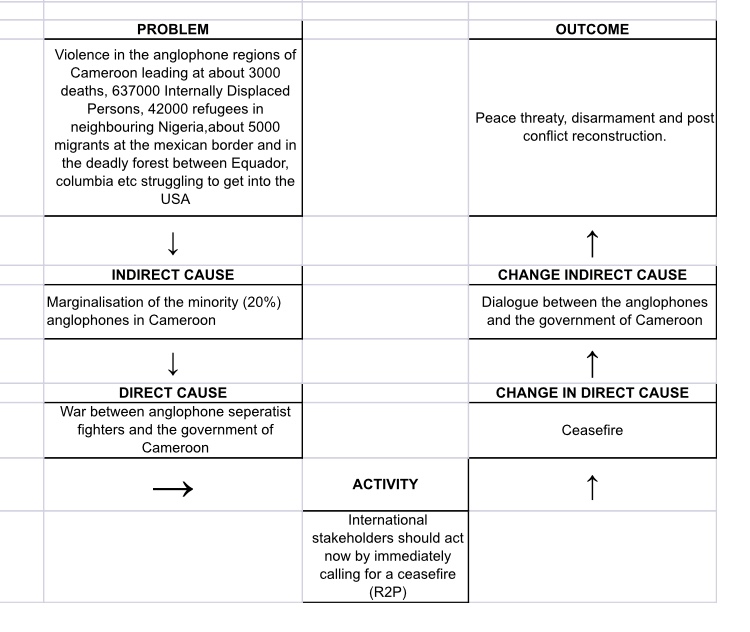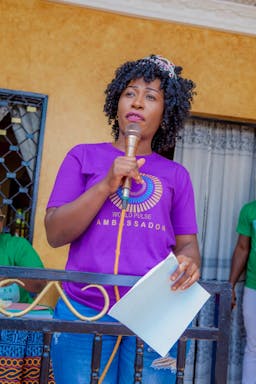FROM CRISIS TO PEACE:The Anglophone Crisis in Cameroon, the way forward.
Nov 24, 2021
Story

Presentation of Cameroon
Geographically, Cameroon (French: Cameroun), officially the Republic of Cameroon (French: La République du Cameroun - LRC), is a country wedged in West and Central Africa. It is bordered by Nigeria to the west; Chad to the northeast; the Central African Republic to the east; Equatorial Guinea, Gabon and the Republic of Congo to the south. Cameroon's coastline lies in the Gulf of Guinea and the Atlantic Ocean.
Due to its strategic position at the crossroads between West and Central Africa, it is often considered as belonging to both regions.
Linguistically, French and English are the official languages of Cameroon; a heritage of the country's colonial past. Eight out of the ten regions of Cameroon (80%) are primarily francophone, while two (20%) of the country’s 25 million inhabitants are Anglophones.
Historically, Cameroon became a German colony in 1884 known as Kamerun. After World War I, the territory was divided between France and the Britain as League of Nations mandate B territories and later on as UN trust territories following the creation of the United Nations Organization in October 1945. On January 1, 1960, the French-administered part of Cameroon became independent as the Republic of Cameroun under President Ahmadou Ahidjo. Britain merged Southern Cameroon with Nigeria to ease her administration. When Britain was granting independence to her colonies, Southern Cameroon was asked to either get her independence by joining Nigeria or federating with French Cameroon but for fear of further torture from Nigerians, she choose to join French Cameroon. The southern part of British Cameroons got its independence on October 1 1961 to form the Federal Republic of Cameroon. Barely three years after the union, the marginalization begun and some individuals like Bernard Folon (late) started pointing out the failures of the union but it fell on deaf eyes. The federation was abandoned in 1972 in favor of a unitary state following the referendum of 20th May 1972. Since 1984, the country is known as the Republic of Cameroon. Paul Biya has been its President since November 6, 1982.
The Eruption of the Anglophone Crisis
Anglophone Cameroon has been under curfew for most of the past two years. Fighting between armed separatists and government forces in the administrative regions of Southwest and Northwest has its roots as far back as in October 2016 after a crack down on a wave of peaceful protests demanding political representation and cultural rights for the Anglophone minority.
This crisis started on October 11, 2016 in Bamenda with a strike of lawyers from the South-West and North-West regions demanding the exclusive practice of the Common Law in their area, as in the federal period, and the cessation of the assignment of French-speaking magistrates and notaries who are not familiar with this system. They were hardly repressed, but reacted one month later, on November 8, 2016, with fresh demonstrations supported by the people.
English speaking teachers followed suit on November 21, 2016 with a school boycott.They demanded the strict application of the English educational system and the non-assignment of French teachers who cannot communicate in English.
On the 21st November, the masses protested led by Mancho Bibixy Tse (a popular journalist) brought a coffin to the city Center and planted himself in it demanding roads, hospitals, jobs, proper waste management, as well as the cessation of the marginalization of Anglophones etc.The protest of this day is significant to the Anglophone community and has been termed "the coffin revolution" as that was the day the protest gained popularity from the masses. Sporadic riots took place during the following days in and around Bamenda and there were dozens of arrests during these events.
Students of the University of Buea came into action on November 28, 2016 with social demands, such as the end of the ban of their association or the end of the financial exploitation of students by the university administration. News of atrocious brutalities, torture and state terrorism, of girls raped by security forces, or forced to roll in muddy waters began to spread. About 100 arrests followed.
A Consortium was formed at the beginning of December 2016 as an instrument to coordinate all the struggles of the English-speaking civil society and to carry out negotiations with government should the opportunity arise.
Deterioration of the Situation
The crisis went on, with no slightest perspective of a solution. Many events unfolded, pointing to a worrying evolution: First, the Consortium was banned in January 2017 and its leaders arrested, and accused before a military court of being “terrorists”. Some were released after months of imprisonment.
On the 22nd of September 2017, the entire Anglophone community came out in a massive number with peace plants protesting and demanding an end to the marginalization of anglophones.At least two people were killed by live bullets.
Many events unfolded and there was therefore a transition from the social and political struggle to an armed struggle of asymmetric war with likely hundreds of deaths, tens of thousands of exiles in Nigeria, not to mention deserted or burnt-down villages. The Anglophone crisis is gradually turning into a civil war. Only an inclusive dialogue of good fate between the Anglophone community and the government can stop the escalation.
As a result of the clashes, more than 3,000 people have reportedly been killed with extra-judicial killings and kidnappings taking place on a daily basis. Civilians have fled their homes and dozens of villages have been burnt down, hundreds of Anglophones are in detention, schools have been shutdown since 2016 with just about 20% of effective schooling in these two regions. According to the UN’s Office for the Coordinator of Humanitarian Affairs and High Commissioner for Refugees, 637,000 persons from the Anglophone regions are internally displaced and 42,000 are refugees in neighboring Nigeria with 65% being women and children. There are also hundreds of Anglophone migrants struggling through the deadly forest of Puma - Columbia-Ecuador- Panama and at the Mexican border with the aim of getting into the United states of America.
The Former British colony (Anglophone Cameroon) has suffered so there is need to put an end to the suffering of the masses. Furthermore, with regards to the ongoing conflict in our region and we are calling on the National and international stakeholders to immediately address the crisis by first imposing a cease fire, secondly arranging for an unconditional dialogue leading to a peace treaty, disarmament and post conflict peace building and reconstruction.
In the meantime, the humanitarian situation in these regions is preoccupying especially for women and children. This is especially the case with refugees in neighbouring Nigeria and those displaced, living in the bushes without food, shelter, clothing or sanitary structures and facilities. Education has become a foregone conclusion and unwanted pregnancies, armed violence, theft, killings, kidnappings and settling of scores, the order of the day. This calls for urgent and immediate international intervention in order to turn the tides. This Responsibility to Protect (R2P) is incumbent on the international community.




